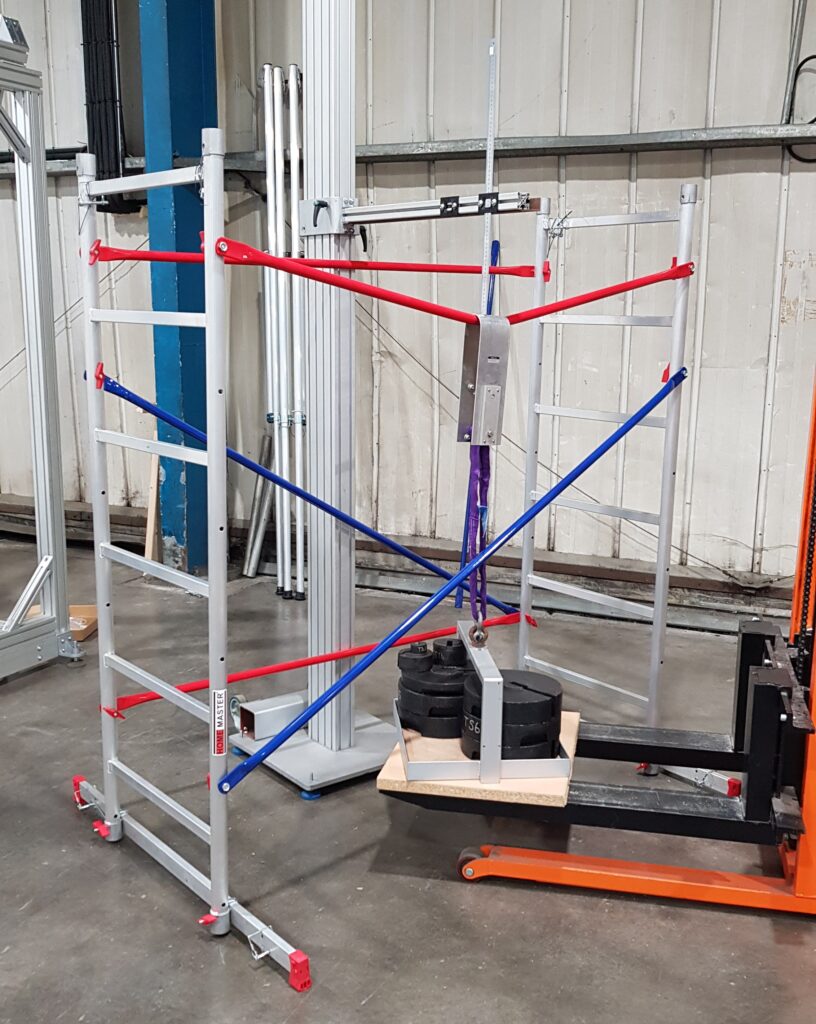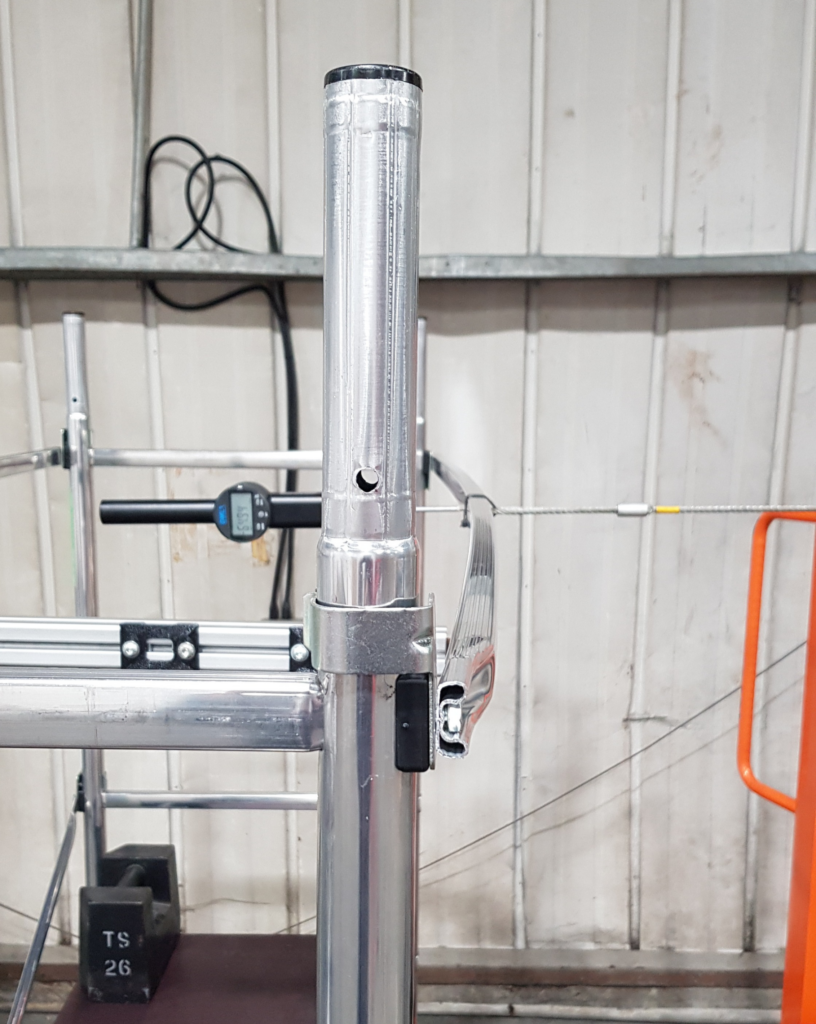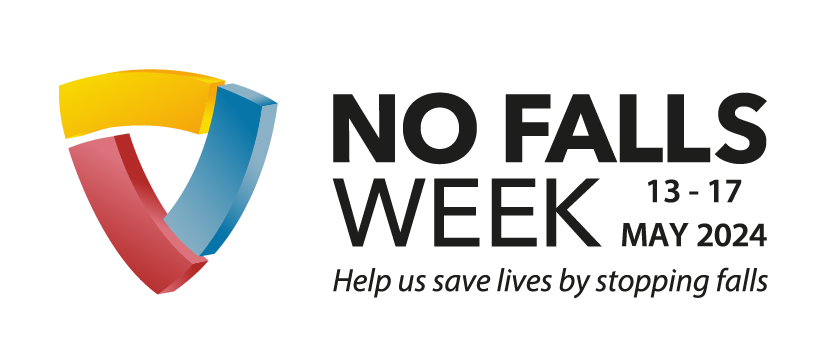Access towers are widely available from hire centres, stores and online marketplaces. Every day, thousands of them are used in workplaces and homes by people who need to work at height.
PASMA strives for a world where, when assembled and used correctly, every one of those towers is safe.
Unfortunately, despite existing legislation and regulations making clear that all products on the market must be safe and existing design standards being well established, there are still towers out there that are not safe at all. These so-called ‘DIY towers’ are readily available and easy to buy online.
To gather intelligence on the state of the market, PASMA undertook market surveillance on ‘DIY towers’ for sale in the UK, putting a selection of them through a series of robust safety tests. We did this in partnership with the Test & Research Centre, the first UKAS-accredited test laboratory for BS EN 1004. What we uncovered was shocking.
Here’s a summary of what we found:
In every ‘DIY tower’ tested, numerous issues were identified that increase the risk of the tower overturning or collapsing, or of a person falling from height.
On a tower with insufficient side protection, our test manikin falls straight to the ground.

A guardrail buckles under load testing designed to mimic the effect of a person falling or leaning against it – this happened at around 55kg (less than 9 stone!)

A ladder rung is permanently deformed during a test designed to mimic the imposed load of a person climbing it.

A guardrail deflects when pulled horizontally, mimicking what might happen if you leaned against it. This creates a gap big enough to fall through.
Have you had an accident involving a ‘DIY tower’? If you’re willing to talk to us, please get in touch. We’d like to learn more about the circumstances and if you’re willing, help you share your story more widely. We can do this anonymously if you prefer.
If you think your tower is unsafe, dangerous or not made to standard, don’t use it! You should contact your local Trading Standards team directly or report it to PASMA so we can pass the information onto the relevant Trading Standards Office to investigate.
Following the results of the surveillance activity, PASMA calls for action to be taken in the following areas, in order to address the sale of dangerous ‘DIY towers’ once and for all:
1. Proactive action from enforcement agencies
We’re calling on Trading Standards, the Health & Safety Executive (HSE) and the Office for Product Safety and Standards (OPSS) to join forces with PASMA to tackle to sale of unsafe ‘DIY towers’ in the UK.
2. Online retailers, market places and social media selling platforms must share the responsibility
We’re calling on retailers to take swift corrective action when they are made aware of unsafe ‘DIY towers’ being sold through their channels, such as those named in our report.
4. DIY manufacturers, importers and suppliers to do the right thing
We’re asking those involved in providing ‘DIY towers’ to read our report carefully, conduct their own investigations into the safety concerns raised and implement whatever corrective actions they find are necessary to ensure their towers are safe.
4. PASMA will continue to raise awareness
Market surveillance is a regular, ongoing process and should be increased or reduced based on risk. PASMA intends to carry out further rounds of market surveillance on ‘DIY towers’ and will systematically work our way through all routes to market. Furthermore, we recognise that ‘DIY towers’ are not just a problem in the UK, but further afield too.
For all press enquiries please contact our marketing team:
Contact: Rhona McCallum (head of marketing and communications)
Email: marketing@pasma.co.uk
PASMA is an official platinum supporter of No Falls Foundation, the only charity dedicated to the work at height sector. The Foundation is striving for a world where everyone who works at height comes back down safely. They undertake projects aimed at preventing falls from height and offer help to people affected by the consequences of a fall.
PASMA, and our members, stand alongside them in this mission.
This campaign was launched during No Falls Week 2024, an annual campaign to raise awareness about the importance of safe working at height.

Member Login Become A Member FAQs Contact
Head Office & Administration Centre
PO Box 26969
Glasgow, G3 9DR
T: +44 (0) 345 230 4041
E: info@pasma.co.uk
Prefabricated Access Suppliers’ & Manufacturers’ Association Ltd (PASMA)
is a Company Limited by Guarantee and registered in England, No. 1397880
Registered VAT No. (GB) 239 439 380.
Access Industry Management & Services Ltd (AIMS)
is a Private Limited Company, registered in England, No. 6923617
Registered VAT No. (GB) 239 439 380
is wholly owned by PASMA, and provides sales and services on behalf of PASMA to non-members.
Each have their registered address at: 167-169 Great Portland Street, 5th Floor, London, W1W 5PF.